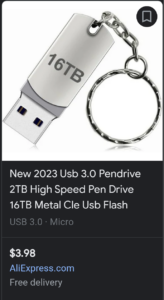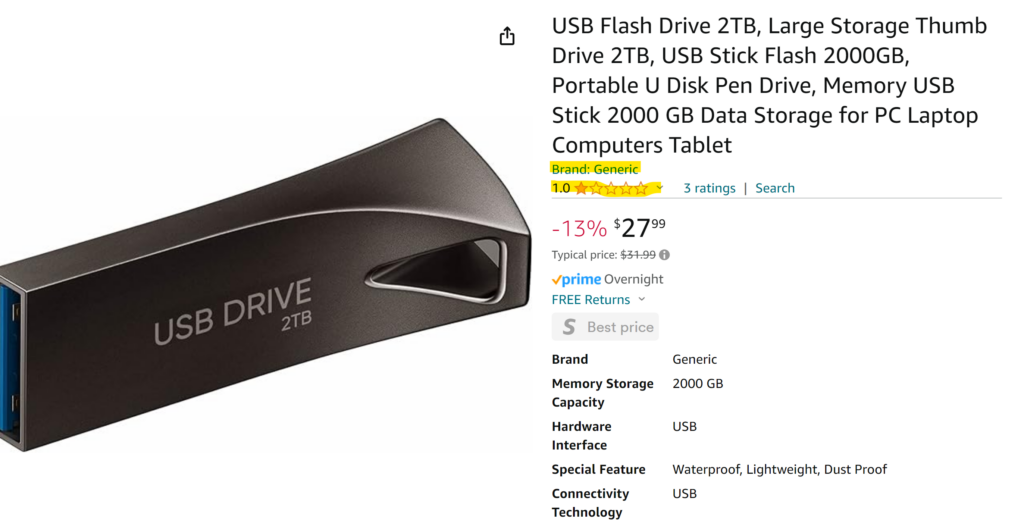Just a reminder for recognizing fake flash media (SSDs and USB flash drives), since I shopped for some recently.
OK I admit it. I look for bargains online that are not smart purchases, e.g. USB flash drives or solid state drives (SSDs) that are cheap. But those bargains may be hiding garbage technology or malicious software. In general, you should buy for the quality and dependability of a known manufacturer (see suggested manufacturers below). Also consider whether you want a lower or higher range drive from these companies as price will vary.
As to what you get for your money, some flash drives and solid state drives (SSDs) have actual storage capacity that is much lower than advertised. For instance, Kingston offers 1TB USB flash drives for about $180 and you cannot buy a legitimate 2TB flash drive for less than $100 (Datarecovery.com). I saw this 16TB flash drive for sale on Bing.

Yeah, right.
Then I saw this one with no reviews and “generic” for the manufacturer.

As to 16TB SSDs, Datarecovery.com says they’re scams, “even if they’re shipped by an otherwise reputable seller.” The site notes that 8TB hard drives from a reputable manufacturer costs at least $150.
Review Geek found that one questionable 16TB SSD contained only 64GB of storage and Datarecovery.com found a 2TB flash drive only had 32GB of storage. You may only see a problem when you try to save data to the drive. Your operating system may show a false capacity and the drive will look to be working correctly—but the data won’t save. Try to return the drive and you could end up with another bogus replacement.
Besides not getting the storage you want, some fake SSDs and USB flash drives can cause other security problems. You may know about the dangers of putting a flash drive you found in a parking lot into your computer: malware and viruses, theft of your data, ransomware infections, unauthorized access to your or your company’s network, or theft of your identity.
Know The Reviews
To prevent falling prey to these false drives and cybersecurity threats, you may find some guidance from your fellow shoppers. Amazon, Walmart, and eBay feature customer reviews from people who bought the product. While you should be careful to believe positive reviews, because shady sellers and scammers can produce false ones, reading the negative reviews may help.
Hallmarks of Fake SSDs and USB Flash Drives
Consider the following signs of fake SSDs and flash drives:
1. Price Too Good to Be True: As mentioned above, believe this old maxim. You get what you pay for.
2. Unusual Packaging that is off or inconsistent with the genuine packaging: look for typos, irregular fonts, or missing holographic seals.
3. Missing Brand Logo or Markings: Genuine USB flash drives and SSDs typically have the brand logo, name, and model number prominently displayed on the drive enclosure.
4. Inconsistent Design: Counterfeits may have irregularities in the shape, size, or materials used.
5. Unfamiliar Brand: Be cautious when dealing with lesser-known or obscure brands, especially if the product is being sold at an unusually low price.
6. Fake Capacity: As I mentioned above; use a reliable capacity-testing tool to verify the actual storage capacity of the drive.
7. Poorly Printed Labels: Inspect the labels on the USB drive for signs of low-quality printing, smudged text, or uneven coloring.
8. Missing Security Features: Genuine USB drives often include security features like holographic seals, tamper-evident packaging, and serial numbers.
9. Suspicious Seller or Source: Unverified or unknown sellers lurk on online marketplaces or on street vendors.
10. Performance Issues: Counterfeit USB drives may appear to “hang forever,” i.e., exhibit slower data transfer speeds or may not function correctly. Test the drive’s performance with benchmarking tools.
11. Misspelled Words: Check the packaging, labels, and user manuals for misspelled words or grammatical errors.
12. Lack of Warranty or Support Information: Authentic USB drives typically come with warranty information and contact details for customer support.
Additionally, bogus SSDs may feel lighter than genuine ones due to the use of cheaper or lower-quality materials.
Shop Wisely
It seems like most of the above can be avoided by buying from known and tested brands. Buy from a reputable manufacturer. Fake USB flash drives and SSDs often have branding from unknown companies and many have no branding whatsoever on their enclosures. Though Amazon and Walmart may be improving, to be ultimately safe you may want to avoid Amazon, Walmart, eBay, or other 3rd party shops and buy directly from the manufacturers.
Here are some recommended brands:
– SanDisk
– Kingston
– Samsung
– Lexar
– ADATA
– PNY
– Transcend
Conclusion: Buy for Quality and Backup
Stores such as Amazon, Ebay, and other online stores and auctions provide information on how to detect fake USB flash drives and SSDs on their sites, using variations of the above recommendations. But as to reliability, one thing to keep in mind regarding flash media is that it can fail at any time (all flash media will eventually fail).
So for your files and media, you should have three backup copies–including one that is on a cloud backup, like Carbonite. Don’t fall victim to bogus disks you find and continue to update your anti-malware software and operating system, and protect your computer using write protection, which will prevent unauthorized file writes from those drives.
When it comes to your data, computers and devices, don’t go cheap. The old maxim stands: if it seems too good to be true, it probably is.
